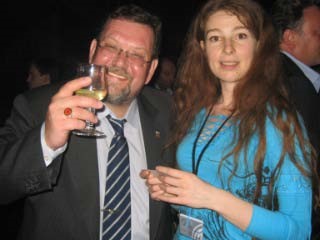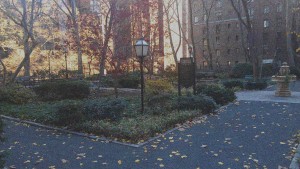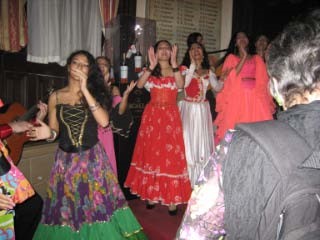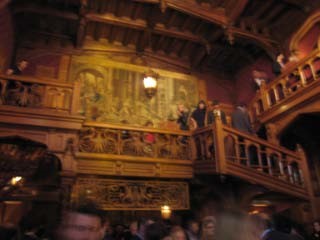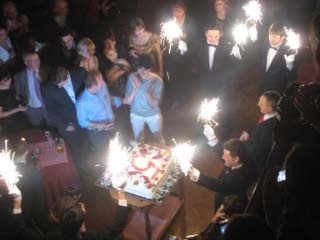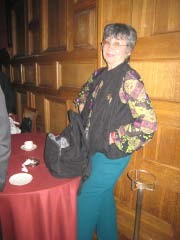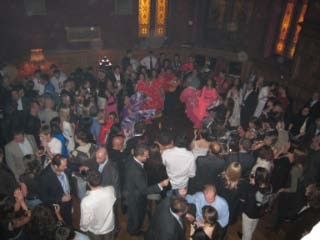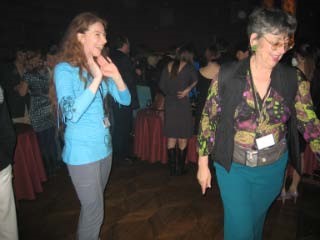Mathes Missive from Moscow #13 – Sunday: In Alexandrovsky Sad with Jane and Julia

Zdrastvuita (an approximation of how you say hello in Russian, according to Julia), from Moscow,
When I run into Jane this morning at the breakfast buffet she demands to know what I am going to take for lunch. You recall that yesterday I had been seriously eying the smoked mackerel, but I just don’t have the Jewish grandmother gene that enables one to load up and spirit away quantities of food from buffets. Jane has such a gene. Also, like all Jewish grandmothers, she travels with plastic bags specifically for this purpose (actually the purpose may also involve cleaning up after her two small dogs in 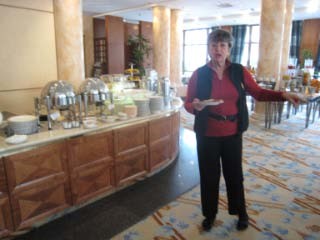 New York, but the point is that she is prepared for everything).
New York, but the point is that she is prepared for everything).
Under the stern gaze of the hotel staff (“they want you to take food with you,” insists Jane), I can’t bring myself to take more than a pear. Rolling her eyes in a manner that would make Terri proud, Jane spirits a croissant back to the table and slips it into a baggie.
“What else?” she whispers.
“Mackerel?”
Even Jane draws the line at this. Alas.
“Take that pear, Charles. At least take that pear.”
“Whatever,” I say, taking a line from Terri’s book. And the pear.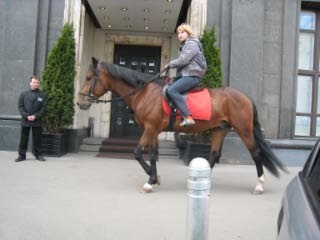
On the way over to the Manege this morning, we see a girl riding a horse down the sidewalk. Both appear sober. Nobody on the street seems particularly surprised — you can see how much Moscow is like New York in this respect. Jane once saw Mayor Koch leading an elephant up Broadway; nobody on the street blinked an eye. All kinds of animals walk our streets. Here, too, I guess.
Whereupon begins another day at the Art Fair, the details of which must remain secret (we do meet some interesting people).
I have to report that, fancy dinners every night notwithstanding, we are under a lot of pressure, pretty worn out and getting a little cranky. All three of us are strong individuals, have similar coughs (I apparently have infected Jane now, too) and are under a lot of pressure. And while many of the interesting people we are meeting are exactly like (and sometimes simply exactly) the cosmopolitan, sophisticated people we meet at art fairs in New York, Miami and Los Angeles, many Russians who have suddenly acquired and are ready to spend great wealth have no experience with the art world. We continually are asked if what we have brought is for sale, and when is our auction. A surprising number of people speak English or French (leaving Julia with less to do than she would prefer), but an equally surprising number will not even give their names; it’s difficult to know which situations will lead to results.
“If he’s such an oligarch,” says Jane after one such encounter, “why doesn’t he have any teeth?”
As a personal trainer in New York, Julia specializes in telling people what to do, getting her own way, and making grown men cry. Jane has the same specialties, which is perhaps why they get along so well. But several times over the past few days Julia has offered to be helpful beyond simple (as if it were simple) translation. She wonders if 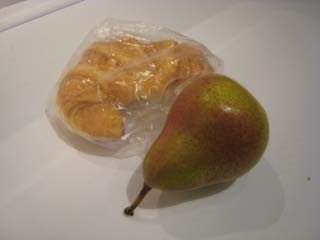 Jane understands all the subtle nuances of cultural differences that present themselves in each encounter. Jane, who has been selling art since the 1960s, doesn’t really need advice on her sales approach at this point in life (especially in the middle of an art fair), and wonders if Julia understands the first thing about the realities and complexities of making sales at this level. Me, I’m wondering if they’re going to be serving food at the big party for exhibitors to which we’ve been invited tonight.
Jane understands all the subtle nuances of cultural differences that present themselves in each encounter. Jane, who has been selling art since the 1960s, doesn’t really need advice on her sales approach at this point in life (especially in the middle of an art fair), and wonders if Julia understands the first thing about the realities and complexities of making sales at this level. Me, I’m wondering if they’re going to be serving food at the big party for exhibitors to which we’ve been invited tonight.
At five o’clock my breakfast has finally worn off and I am a grateful for my pear and for the croissant that Jane has spirited from the buffet. One of Julia’s many friends who have come to visit us has brought a vegetable pie (hours ago Julia polished off the remains of the fish pie from Godunov’s) of which we also partake. Then Julia and Jane gang up on me for not making away with more from breakfast.
“Did you grow up rich and didn’t have to learn to forage for food?” they demand.
I blame it all on my mother, who kept reading me the same Aesop fable over and over when I was a little boy. The one about the man who, as he is being led to the gallows asks to be allowed to whisper into his mother’s ear. Instead, he bites it off. “Why?” she cries.
“Because when I was a little boy and I stole that first piece of smoked mackerel,” he says — as I recall it, “you didn’t punish me, and so soon I was stealing horses, then knocking over banks, and finally murder, which has brought me to where I am today!”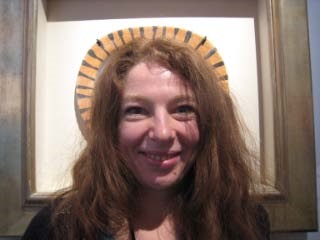
I think I was about 45 years old before my little mother for the first time dared to start believing that I wouldn’t end up on the gallows. She still will not let me whisper into her ear.
So is it any surprise that I am horrified when Julia now says that since fish is smoked to preserve it, this is something we should perhaps take away in little baggies tomorrow, besides more fruit, rolls and pastry (for all I know she is thinking about the silverware, too). Who knew that Julia would have the Jewish grandmother gene!
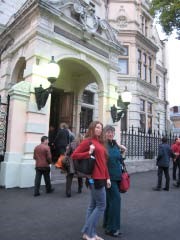 At nine o’clock the fair ends for the night, and we proceed to the minibuses that the Fair organizers have arranged to take us to the Exhibitors party at the prestigious Central Writers House, which I gather was some kind of exclusive private club for people like Nabakov during Soviet times and is still one of the fanciest venues in the city. Julia knows we will be particularly happy that there will be gypsy musicians and dancers tonight. (It is always best to hire gypsy musicians for gypsy dancers, Julia says, proudly telling a story she heard about how when regular musicians took a break, the gypsy dancers opened the door to the back alley and sold their instruments).
At nine o’clock the fair ends for the night, and we proceed to the minibuses that the Fair organizers have arranged to take us to the Exhibitors party at the prestigious Central Writers House, which I gather was some kind of exclusive private club for people like Nabakov during Soviet times and is still one of the fanciest venues in the city. Julia knows we will be particularly happy that there will be gypsy musicians and dancers tonight. (It is always best to hire gypsy musicians for gypsy dancers, Julia says, proudly telling a story she heard about how when regular musicians took a break, the gypsy dancers opened the door to the back alley and sold their instruments).
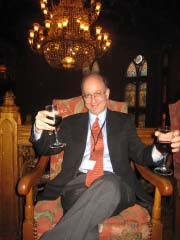 Central Writers House turns out to be a spectacular multi-level palace, all wood-paneled, and complete with towering stained glass windows. There are lavish buffets of food everywhere, wine, women and song. Now we know another reason why the booth costs are astronomical; this bash is going to cost somebody a fortune, and that somebody is us! The din is incredible. The only places to sit are upstairs, which doubles as a cigar lounge (which like the premium scotches, the vodka and the gallons of Cognac are distributed freely). People crush happily into one another. As Jane later described the scene: “There was food but you couldn’t reach it. There was dancing but you couldn’t see it. There was air, but you couldn’t breathe it.”
Central Writers House turns out to be a spectacular multi-level palace, all wood-paneled, and complete with towering stained glass windows. There are lavish buffets of food everywhere, wine, women and song. Now we know another reason why the booth costs are astronomical; this bash is going to cost somebody a fortune, and that somebody is us! The din is incredible. The only places to sit are upstairs, which doubles as a cigar lounge (which like the premium scotches, the vodka and the gallons of Cognac are distributed freely). People crush happily into one another. As Jane later described the scene: “There was food but you couldn’t reach it. There was dancing but you couldn’t see it. There was air, but you couldn’t breathe it.”
Actually she did reach the food and went on and on about how marvelous the crabcakes were. They were chicken. You lose some of your sense of taste when you have a cold.
We’re always being pestered by artists who somehow think that even though our gallery is limited to handling people like Picasso and Chagall, what we really want to do is represent them, too. This is the first time I was ever so pestered by woman artist who was smoking a cigar. Apparently she had interpreted William Shakespeare sonnets in lithography and wanted to know what I thought.
I recited “Shall I compare thee to a summer’s day?” (my father would be pleased that my M.F.A. in Theatre has finally come in so handy) and escaped into the crowd as she chewed her cigar, trying to figure out what the hell I had said. Even Julia couldn’t translate!
Somewhere around midnight Jane runs into William, the charming young Frenchman who was so helpful to Jane in Paris when we learned that the deadline for shipping all of our art to Geneva was not April 15 as we had been told all along, but March 15 (it was then the first week of March). Thanks to William, whom Jane always describes as wonderful and helpful, she was able to spend two days furious designing the booth from wrong dimensions, order all the lighting fixtures (every one of which Nicola had to replace the night before the opening), and it was William who presented the bill for the lights on Friday, payable Monday (this morning he showed up and said our credit card had expired — luckily Jane had it, unexpired, in her backpack).
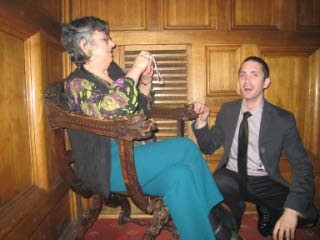 Now William tells her that tomorrow, Monday night, after the fair ends, we will not be allowed to move out as planned. No, the move-out can only commence on Tuesday.
Now William tells her that tomorrow, Monday night, after the fair ends, we will not be allowed to move out as planned. No, the move-out can only commence on Tuesday.
To give you some perspective on what this little piece of eleventh (twelfth, actually) hour information means, here’s what usually happens during a fair move-out. I’ve been doing these with Jane since 1994 at dozens of fairs in New York City, in Miami, in Los Angeles, in Seattle and other places. When the doors are closed for the last time to the public, work crews which have been assembling for the past few hours descend and start removing the art from the walls. Each piece must be checked off on a disposition list, packed up for transit, taken out to a waiting truck, and then checked again against the list to make sure that everything that left the hall made it onto the truck. Sometimes our registrar or another person on our staff checks the items against the disposition list, while a team of hired art handlers packs each piece up. Other times our hired art handlers take responsibility for all the checking, too. Usually a fair closes no later than seven o’clock on the last night. Depending on unpredictables — especially in union venues — the truck can be loaded and on the road as early as ten o’clock or as late as five or six the next morning (don’t expect a lot of sleep if you are doing any fairs at the Javits Convention Center in New York).
Over all the past months nobody at the fair has been able to tell us exactly what to expect during the move-out, despite our asking numerous times. In our planning we have tried to cover all possible situations. While we didn’t know whether it would be the French or Russian handlers who would be helping us pack, we had to assume that they would be as good as their American counterparts. Jane speaks French and Julia speaks Russian, so we will be able to tell them exactly what to do.
It is the handlers who actually do most (or, even all, as I said) the work, so our participation will be limited to checking the works against the disposition lists and making sure that nothing is left behind. The fair doesn’t conclude until 9:00 pm, so we know that it’s going to be a late night. To save an extra night in the hotel, I am checking out and flying back to New York on Tuesday. I can work all night if necessary, but I know that Jane will probably not want to stay too much past midnight. With any luck we will have a good grip on things by then, and either the handlers can finish up on Tuesday morning, some time between 1:00 am and 5:00 pm. Jane isn’t leaving until Wednesday, so she can instruct handlers in French if necessary all Tuesday. We’ve been told that the Russian handlers are not as good as the French (I’m hoping these are not the same guys who refused to hammer a nail into a wall, but Julia, Jane and I can take the paintings off the walls if necessary), so Julia is staying until Thursday, so that she can wrap things up in Russian if it comes to that.
Because we are in a strange country (make that ‘Strange’), international customs are involved, and shipping is more complex since crates are requir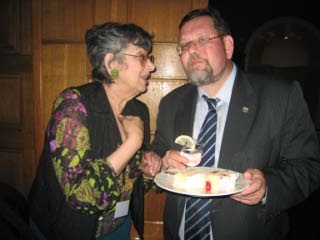 ed. We know things will be more complicated, but we have great confidence that everything will be okay. Make that ‘had great confidence.’ If nothing is going to start until Tuesday when I am already gone, will there be enough time for Jane to finish everything before she leaves. And how many other galleries are the French handlers handling? Are they going to keep us waiting until dinnertime? (It could happen, I suppose, but Jane will probably drag them over by their heels long before then.) At least we have established a nice relationship with Natalia, the customs person who with Jane checked each piece as it was uncrated against the shipped items list. We gave her passes to the show and she seemed very impressed.
ed. We know things will be more complicated, but we have great confidence that everything will be okay. Make that ‘had great confidence.’ If nothing is going to start until Tuesday when I am already gone, will there be enough time for Jane to finish everything before she leaves. And how many other galleries are the French handlers handling? Are they going to keep us waiting until dinnertime? (It could happen, I suppose, but Jane will probably drag them over by their heels long before then.) At least we have established a nice relationship with Natalia, the customs person who with Jane checked each piece as it was uncrated against the shipped items list. We gave her passes to the show and she seemed very impressed.
We run into Oxana, the marvelous efficient manager of the Russian team, and ask what the move-out will be like.
“Chaos, I think,” she says happily.
What was it like last year?
“Chaos.”
I have made friends with a big bear of a Russian, whom I think I will call Ivan the Terrible. It’s just like in the movies — we collide at the bar and both try to get a vodka, then defer to the other. You, first, Alphonse. No, you, Gaston. Of course, he speaks no English. When we have both gotten our little glasses, we click, and drink – Tovarish (he’s actually the one who gives me the blank look at this expression)! Here’s to Vodka, the universal communication.
With Jane suitably dazed by her talk with William, hacking from cigar smoke and Charles’s cold, and stuffed to the gills with every fancy food imaginable that has been served throughout the night on the dark buffet tables against the backdrop of wall-to-wall intoxicated art dealers and gypsy music, I introduce her to Ivan the Terrible, who has found out that I have had only two tiny glasses of vodka to his four, so has brought me a tumblerful (well, not a tumbler, but certainly a bigger glass).
It turns out (now that Julia is corralled to translate), Ivan is a journalist. Hard to understand what else he was saying, even translated into English. He did kiss Jane’s hand several times and say he would come by the Manege tomorrow. If he does, I think she may kill me for making the introduction.
We get back to the hotel at 1:30 in the morning. A dandy time was had by all. 